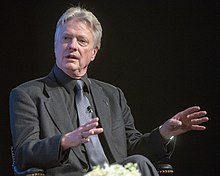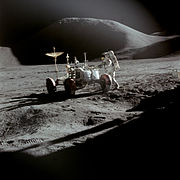Roger D. Launius
This biographical article is written like a résumé. (August 2022) |
Roger D. Launius | |
|---|---|
 | |
| Born | May 15, 1954 Galesburg, Illinois, U.S. |
| Nationality | American |
| Alma mater | Graceland College, Louisiana State University |
| Occupation(s) | Historian and author |
| Employer(s) | NASA, National Air and Space Museum |
| Website | https://launiusr.wordpress.com/ |
| External videos | |
|---|---|
 | |
Roger D. Launius (born May 15, 1954) is an American historian and author of Lithuanian descent, a former chief historian of NASA. He retired in 2016 as Associate Director for Collections and Curatorial Affairs for the Smithsonian National Air and Space Museum in Washington, D.C.[1] Launius is a consulting historian in air and space history. He has written many books on space flight, and also published on the history of the Latter Day Saint movement.[2]
Early life and education
[edit]Launius was born in Galesburg, Illinois, and was raised in Greenville, South Carolina.[3] He graduated from Graceland College in 1976 and received a PhD in history in 1982 from Louisiana State University.[2]
Career
[edit]From 1982 to 1990, Launius held several positions as a civilian historian with the United States Air Force.[2] Between 1990 and 2002, he was the chief historian for NASA. In 2001, he held the Charles A. Lindbergh Chair in Aerospace History at the Smithsonian.[4] From 2002-2006 he was Chair of the Division of Space History at the Smithsonian National Air and Space Museum. From 2006-2013 he was Senior Curator, and from 2013-2016 Launius was Associate Director for Collections and Curatorial Affairs at the same institution.[5]
Launius contributed space policy analysis in the wake of the Columbia Accident Investigation Board 2003 report.[6][7] He has been a regular commentator on space-related issues for the news media.[8][9][10]
[11] He was president of the Mormon History Association in 1993–94[12] and was president of the John Whitmer Historical Association in 1991–92.[13]
Publications
[edit]
Launius has written more than twenty books and 100 articles on the history of aerospace.[2] Some titles include Historical analogs for the stimulation of space commerce (2014), Space shuttle legacy : how we did it and what we learned (2013), and Exploring the Solar System: The History and Science of Planetary Probes (2012). He has twice won the AIAA History Manuscript Award, forComing Home: Reentry and Recovery from Space in 2011,[14] and for Space Stations: Base Camps to the Stars in 2003.[15][16]
Launius has published on the history of the Latter Day Saint movement. He won both the David Woolley Evans and Beatrice Evans Biography Award (1989) and the John Whitmer Historical Association Best Book Award for his work on Mormon history, Joseph Smith III: Pragmatic Prophet.[17]
Launius studies the history of baseball in the United States, and published Charlie Finley: The Outrageous Story of Baseball's Super Showman with G. Michael Green.[2][18]
Awards and honors
[edit]Launius other awards include:
- John F. Kennedy Astronautics Award, American Astronautical Society, 2009, as an "individual who has made an outstanding contribution to public service through leadership in promoting our space programs for the exploration and utilization of outer space".[19]
- Secretary's Research Prize, Smithsonian Institution, 2009.[20]
- Roger R. Trask Award, Society for History in the Federal Government, 2009.[21]
- Director's Award, National Air and Space Museum, 2008.[4]
- Harmon Memorial Lecturer in Military History, United States Air Force Academy, 2006.[22]
- NASA Distinguished Service Medal, 2001.[4]
- NASA Exceptional Service Medal, 1999.[4]
- Charles Thomson Prize, 1995, 1998, 2008, 2012[23]
Launius is a fellow of the American Association for the Advancement of Science (2007), the American Astronomical Society (2001), and the International Academy of Astronautics (2007).[5][4] He is an Associate Fellow of the American Institute for Aeronautics and Astronautics (2008).[4]
References
[edit]- ^ Curriculum vitae Retrieved April 7, 2018
- ^ a b c d e "Dr Roger Launius". Smithsonian National Air and Space Museum. Archived from the original on 5 July 2016. Retrieved 31 March 2018.
- ^ "Roger Launius". NASA. 22 November 2007. Retrieved 16 January 2023.
- ^ a b c d e f Launius, Roger D. "Curriculum Vitae" (PDF). Smithsonian Institution. Retrieved 1 June 2016.
- ^ a b Bainbridge, William Sims (2012). Leadership in science and technology : a reference handbook. Los Angeles: Sage. p. xxxiii. ISBN 9781412976886. Retrieved 1 June 2016.
- ^ Logsdon, John M. (2013). "Chapter 8: A Failure of National Leadership": Why No Replacement for the Space Shuttle?" (PDF). Critical Issues in the History of Spaceflight. National Aeronautics and Space Administration. ISBN 978-1493716630. Retrieved 1 June 2016.
- ^ Leusner, Jim (August 27, 2003). "Report Names Few But Finds Fault With Top Managers". Orlando Sentinel. Retrieved 1 June 2016.
- ^ Schulz, William (February 10, 2003). "Columbia Lost: Humans in Space". Chemical & Engineering News. 81 (6): 7. doi:10.1021/cen-v081n006.p007. Retrieved 1 June 2016.
- ^ Roylance, Frank D. (October 9, 2011). "Space telescope faces setback". South Coast Today. Retrieved 1 June 2016.
- ^ Campo-Flores, Arian; Hotz, Robert Lee (July 9, 2011). "One Last Spin Around the Planet". Wall Street Journal. Retrieved 1 June 2016.
- ^ Launius, Roger D. (2006). "Is Joseph Smith Relevant to the Community of Christ?" (PDF). Dialogue: A Journal of Mormon Thought. 39 (4): 58–67. doi:10.2307/45227214. JSTOR 45227214. S2CID 254402921. Retrieved 1 June 2016.
- ^ Launius, Roger D. (1995). "Presidential Address: Mormon Memory, Mormon Myth, and Mormon History". Journal of Mormon History. 21 (1). Retrieved 1 June 2016.
- ^ "Past Presidents" (PDF). The John Whitmer Historical Association Journal. 34 (2): vii. 2014. Retrieved 1 June 2016.
- ^ "Are We Alone in the Universe?" (PDF). American Institute of Aeronautics and Astronautics. Retrieved 1 June 2016.
- ^ Pursell, Carroll W., ed. (2008). A companion to American technology. Oxford: Blackwell. pp. viii–ix. ISBN 978-1405179942. Retrieved 1 June 2016.
- ^ "History Manuscript Award Recipients". American Institute of Aeronautics and Astronautics. Retrieved 1 June 2016.
- ^ "Joseph Smith III Pragmatic Prophet". University of Illinois Press. Retrieved 1 June 2016.
- ^ Weingarden, Steve (2010). "Review: Charlie Finley". Baseball Research Journal. Retrieved June 1, 2016.
- ^ "AAS Annual Awards Recipients" (PDF). Space Times: The Magazine of the American Astronautical Society. 48 (5): 20. 2009. Retrieved 1 June 2016.
- ^ "Smithsonian Congress of Scholars Secretary's Research Awards, 2009". Smithsonian. Retrieved 2 June 2016.
- ^ Launius, Roger D. (2010). "Federal History and National Identity: Reflections from the Trenches" (PDF). Federal History (2). Retrieved 2 June 2016.
- ^ Launius, Roger D. (2006). "The Forty-ninth Harmon Memorial Lecture in Military History: National Security: Space and the Course of Recent U.S. History" (PDF). United States Air Force Academy.
- ^ "Past Award Winners: Charles Thomson Prize". Society for History in the Federal Government. Retrieved 2 June 2016.
External links
[edit]- 1954 births
- Living people
- Air force historians
- 21st-century American historians
- 21st-century American male writers
- American members of the Community of Christ
- Graceland University alumni
- American aviation historians
- Historians of the Latter Day Saint movement
- Louisiana State University alumni
- NASA people
- Writers from Greenville, South Carolina
- Smithsonian Institution people
- United States Air Force civilians
- American people of Lithuanian descent
- American male non-fiction writers
